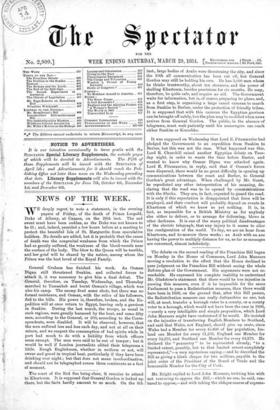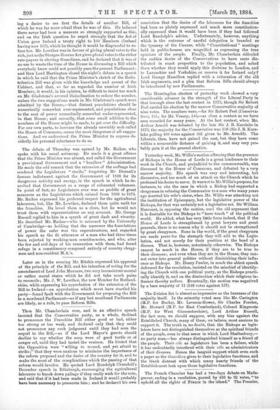Mr. Bright replied to Lord John Manners, twitting him with
not venturing to oppose the Bill,—which no one, he said, ven- tured to oppose,—and with taking the oblique coarse of express- lag a desire to see first the details of another Bill, of which he was far more afraid than he was of this. -He believed there never had been a measure so strongly supported as this, and on the Irish question he urged strongly that the Act of Union gave Ireland a treaty right to 100 Members (Ireland having now 103), which he thought it would be disgraceful to re- fuse her. Mr. Lowther was in favour of giving plural votes to the rich, just as the Sturges-Bourne Act give is plural votes to the richer rate-payers in electing Guardians, and he declared that it was of no use to waste the time of the House in discussing a Bill which everybody knew could not possibly pass the present Parliament ; and then Lord Hartington closed the night's debate in a speech in which he said that the Prime Minister's sketch of the Redis. tribntion Bill was given with the knowledge and assent of the Cabinet, and that, so far as regarded the number of Irish Members, it would, in his opinion, be difficult to insist too much on Mr. Gladstone's avowed disinclination to reduce the number, unless the two suggestions made in Mr. Gladstone's speech were admitted by the House,—that distant populations should be numerically somewhat over-represented, and populations close to the seat of power numerically somewhat under-represented, in that House ; and secondly, that some small addition to the numbers of the House might be made, to get over the difficulty. For our own parts, to increase the already unwieldy mob called the House of Commons, seems the most dangerous of all sugges- tions. And we understood the Prime Minister to express de- cidedly his personal reluctance to do so.



































 Previous page
Previous page